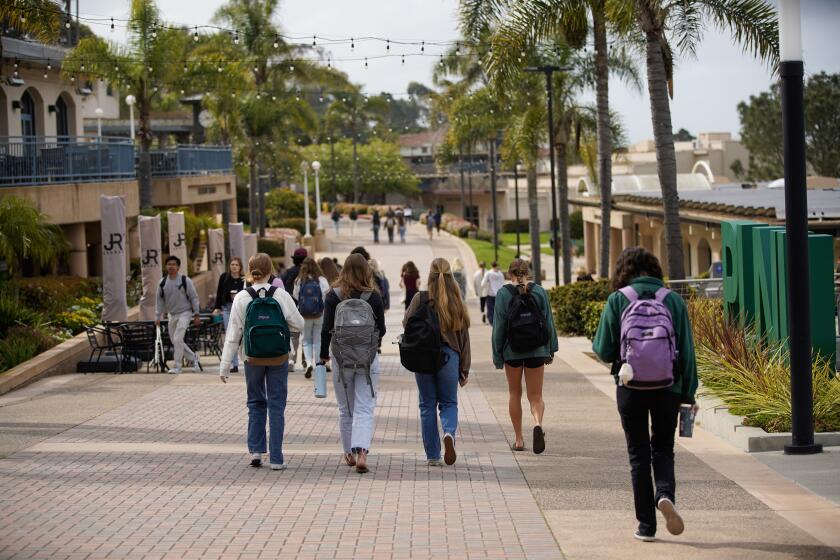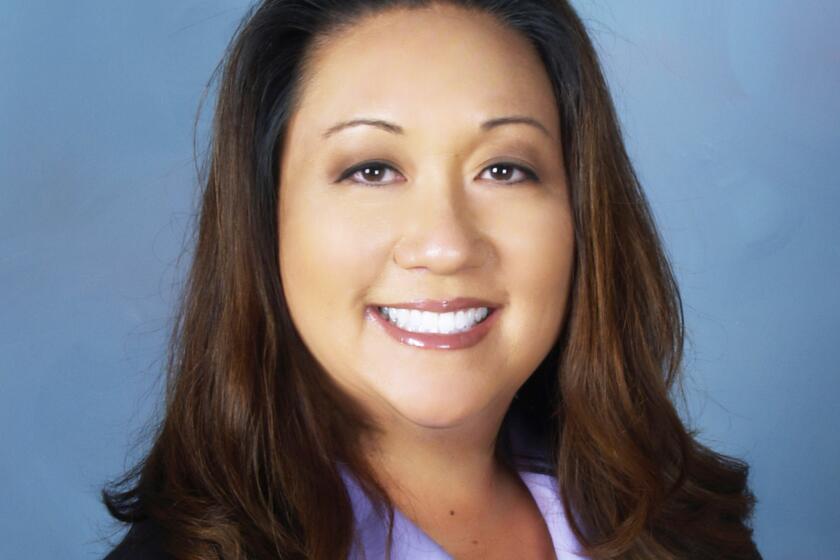UC San Diego accidentally overstated success of its MBA program in Financial Times rankings
UC San Diego says that it provided erroneous data to the Financial Times about the success of its MBA program while the newspaper was putting together its influential 2020 rankings of the world’s top MBA programs.
But the university caught the error in time to provide correct data to U.S. News & World Report, according to Lisa Ordóñez, dean of UCSD’s Rady School of Management.
Rady initially told the Financial Times that 76 percent of the full-time students who graduated with an MBA in 2019 had accepted a job within three months of earning their degree. An internal review revealed that the correct figure was 63 percent.
The school attributed the mistake to an “outdated” method for analyzing career placement information and said it had fixed the issue.
“I take complete responsibility for this reporting error,” Ordóñez said in a March 2 email to the Rady School of Management community.
UCSD uses academic rankings to market its offerings, including its MBA program, which charged full-time California residents $51,453 in academic fees for 2019-20 year.
Rady appears in 96th place in the 2020 Financial Times MBA rankings. It didn’t make the top 100 a year earlier.
Ordóñez, a UC Berkeley-trained quantitative psychologist, became Rady’s dean in September.
“Simply stated, we had not collected and documented the proper evidence to justify our (job) classifications,” Ordóñez said in the email. “Thus, without this evidence, we had to reclassify six of 55 students as not accepting a job at three months after graduation.”
She added, “We have submitted a letter to the Financial Times explaining our mistake and received their response. Since they cannot change the print version of the rankings that have already been published, they will not change our ranking. In addition, they will allow us to submit data again next year. Thus, we have not incurred a penalty after informing them of our error.”
The Union-Tribune asked the Financial Times by email about Rady’s characterization of the situation, but did not receive a response. Ordóñez also declined to answer questions.
Misreporting data is not unusual. U.S. News said it had received incorrect data from five schools last year, including UC Berkeley, which had been providing suspect information for years. U.S. News responded by removing Berkeley from its Best College Rankings list, which is widely read by students and parents.
Rady is unlikely to suffer any long-term damage to its reputation as a result of the error.
“It sounds like Ordóñez did the right thing in admitting the mistake and apologizing for it,” said Ira Kalb, a marketing professor at the University of Southern California. “She also put the problem into perspective and proposed a solution for making sure it wouldn’t happen again.”
Scott Jaschik, editor of Inside Higher Education, an online news site, also said UCSD wasn’t likely to suffer any long-term damage.
“UCSD isn’t in the top 10 of the Financial Times list of the best MBA schools, so people aren’t going to make a big deal about it,” Jaschik said. “It would have been a problem if this had involved dishonesty, which doesn’t seem to be the case.”
Among Ordóñez’s areas of academic interest are ethical behavior and decision making, topics that surfaced when it was discovered that the school had distributed incorrect placement numbers.
“The silver lining in this situation is that we have a culture where people feel comfortable coming forward with this important information,” Ordóñez said. “In addition, we demonstrated our integrity (one of our five core values) by correcting our error with the Financial Times. Our major benefactor, Ernest Rady, often discusses the importance of integrity and believes that his success has been due to his ethical business practices. Thus, we wanted to correct this error as soon as we were able.”
Get Essential San Diego, weekday mornings
Get top headlines from the Union-Tribune in your inbox weekday mornings, including top news, local, sports, business, entertainment and opinion.
You may occasionally receive promotional content from the San Diego Union-Tribune.









